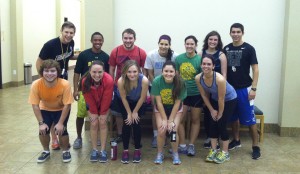
By Rae Jefferson
Staff Writer
Baylor’s Christian affiliation has made discussions about faith an expected occurrence for most students in academic settings.
One group of students, however, has carried the discussion beyond the confines of the classroom and strives to keep the conversation open to students of any belief system – something that can be difficult to achieve at a Christian institution.
Courtney Lyons, assistant director of student success, is the faculty member responsible for spearheading an out-of-class discussion group about religion that has attracted dozens of her former students.
The group, which began meeting last semester, is not sponsored by Baylor and focuses on promoting member diversity. Lyons, an ordained Baptist minister, said any of her former students can join the group regardless of religious affiliation.
“We have a lot of diversity in our group, and the conversation is wide open for students to contribute,” she said. “This is a place, of many, where they can have a voice and say, ‘This is my perspective on faith, and if I’m not a Christian, it’s not because I’m immature or whatever other stereotypes exist, it’s based on my own conclusion and upbringing.’”
Lyons said admission to the group is restricted to her former students because there is a greater sense of familiarity between herself and the students.
“It gives us four months of history with each other that lets our conversations build on that rapport or trust,” Lyons said.
The group’s members come from a variety of religious and nonreligious backgrounds such as Buddhism, Christianity, atheism and agnosticism, and also represent all four classifications and every school on Baylor’s campus, Lyons said.
Houston junior Kim Dang, a practicing Buddhist, wrote in an email to the Lariat that she joined the discussion group to expand her knowledge of Christianity and teach her Christian peers about her beliefs.
“It’s kind of a symbiotic relationship where we help each other learn and grow with bringing in our beliefs and discussing them,” she wrote. “The discussion group is comprised of people of different denominations, but I try to bring in an even higher level of diversity with my non-Christian beliefs.”
Saginaw, Mich., junior Abbie Greenwell began attending the discussion group about halfway through the fall semester. She said the topics cause her to think critically about her belief system.
“There are so many different worldviews and opinions,” Greenwell said. “I really appreciate the opportunity to talk to people of different opinions. It forces me to think about why I think the way I think.”
Dang wrote she agreed the conversations have expanded her ability to be more accepting of others’ ideas.
“I believe that I have grown as a person by listening to others’ beliefs,” she wrote in the email. “It takes away ignorance and helps to better my understanding of Christianity.”
Greenwell said she has been challenged to look at different topics from new points of view because of the thoughts presented by other students.
“It’s opened my eyes to different perspectives,” she said. “Sometimes it’s hard to think outside of the Baylor Bubble – which is really sad.”
Lyons said the goal of the group is to provide students with “mutual educational exchange, spiritual and intellectual formation, a learning community and fellowship.”
“We want to think together about our experiences of faith,” Lyons said. “We want to consider new ideas, learn about things that are different from our own experiences, and model respectful community.”
The group, Lyons said, was started after a student approached her with an interest in continuing class discussions about religion, which frequently took place in Lyons’s Introduction to Christian Scripture and Introduction to Christian Heritage classes, outside of class in a voluntary discussion group.
Lyons said although she initiated the formation of the group and hosts the meetings at her apartment once a month, the direction of the group is largely dictated by the students.
“I let students initiate our conversation topics,” she said. “We connect through Facebook and Blackboard between meetings, but students are responsible for bringing topics and ideas for us to discuss.”
This level of student involvement ensures that students are able to talk about what is interesting or important to them personally, Lyons said.
Past conversation topics include the pope; Christian responsibility to injustice, sexuality and sexual orientation; feminism; and separation of church and state.
“No subject or view point is off limits because we want to create a safe space for respectful dialogue on issues that matter to the students,” Lyons said. “The students regularly bounce ideas off of each other and learn in conversation with each other.”
Dang wrote that she is sometimes apprehensive when it comes to adding to the conversation.
“As the minority, sometimes I am afraid I might offend the other group members with my beliefs,” Dang wrote in her email. “I think that some of my beliefs are very different from the majority of beliefs at Baylor.”
Although this freedom of discussion can cause tension, Greenwell said she sees it as beneficial.
“It teaches you to separate how you feel about a person from their opinions, which is powerful because people often dislike other people because of the views they hold,” she said.
Greenwell said the group sometimes provides a platform for sharing personal challenges, rather than remaining focused on issues affecting the church.
“It’s a safe place to tap into other people’s views and opinions on whatever the situation is,” she said.
Dang wrote that she remembered a meeting last fall when the students helped Lyons move her belongings when her apartment flooded. Dang said these kinds of interactions have revealed a deeper purpose behind the group.“It’s sort of a support group,” she wrote.
Lyons echoed these sentiments, calling the discussion group a little family.






